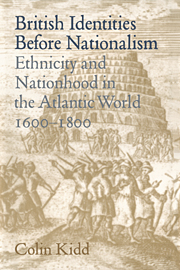Book contents
- Frontmatter
- Contents
- Acknowledgements
- Note
- List of abbreviations
- 1 Introduction
- Part I Theological contexts
- Part II The three kingdoms
- 4 Whose ancient constitution? Ethnicity and the English past, 1600–1800
- 5 Britons, Saxons and the Anglican quest for legitimacy
- 6 The Gaelic dilemma in early modern Scottish political culture
- 7 The weave of Irish identities, 1600–1790
- Part III Points of contact
- Index
7 - The weave of Irish identities, 1600–1790
Published online by Cambridge University Press: 06 July 2009
- Frontmatter
- Contents
- Acknowledgements
- Note
- List of abbreviations
- 1 Introduction
- Part I Theological contexts
- Part II The three kingdoms
- 4 Whose ancient constitution? Ethnicity and the English past, 1600–1800
- 5 Britons, Saxons and the Anglican quest for legitimacy
- 6 The Gaelic dilemma in early modern Scottish political culture
- 7 The weave of Irish identities, 1600–1790
- Part III Points of contact
- Index
Summary
The contentious role played by ethnic identity in the history of Ireland makes it easy to forget that the Irish, like other nations, have played out their conflicts in a world of imagined communities. Yet, a variety of typical early modern ideological constructions confounds the historian who expects to find a clear and unambiguous relationship between communal ancestry and identity. Indeed, ‘real’ and ‘imagined’ pedigrees were often incongruent, and numerous inconsistencies occurred in the use of overlapping ethnic and religious labels. It is one of the poignant ironies of its history that the undisputed reality of ethnic division and hostility is fuelled in Ireland as elsewhere by a large measure of invention. Ongoing and creative processes of ethnogenesis – rather than biological or cultural continuities – form the early modern backdrop to the tragedy of Ireland's story.
There is no contesting, however, the central importance of ethnicity in early modern Irish politics. The ‘nation’ was divided into three distinct groups defined largely by ethnic origin, though secondarily and increasingly by religious confession. The Old Irish – also known in their histories as the Milesians – were the historic inhabitants of the island whose presence long preceded the twelfth-century Anglo-Norman settlement. The Old English were largely the descendants of this latter group of medieval colonists. Over the course of subsequent centuries they had, according to their New English detractors, gone native, becoming suspiciously Hibernicised in their customs. The New English were the post-Reformation settlers of Ireland.
- Type
- Chapter
- Information
- British Identities before NationalismEthnicity and Nationhood in the Atlantic World, 1600–1800, pp. 146 - 182Publisher: Cambridge University PressPrint publication year: 1999



